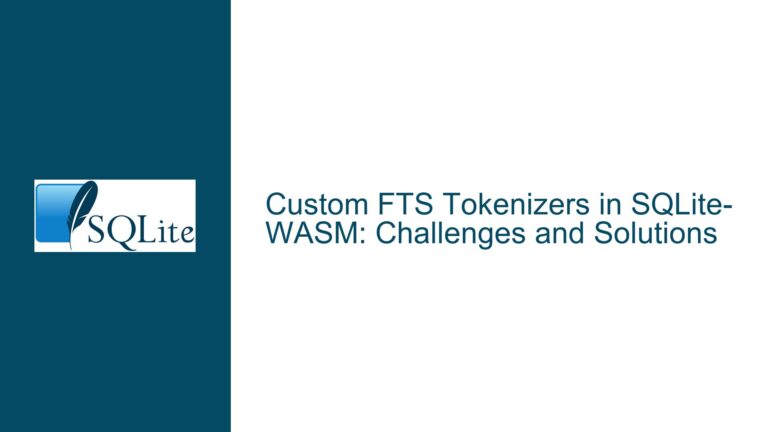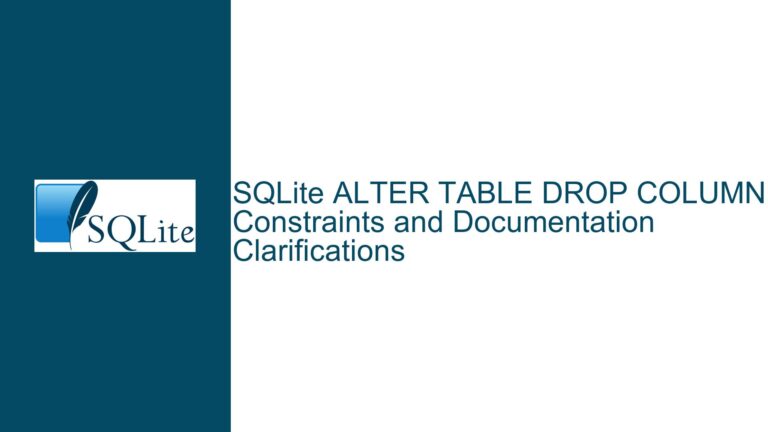Enabling Control Flow Guard in SQLite.Interop Builds for Enhanced Security
Security Implications of Missing Control Flow Guard in SQLite.Interop Binaries
The absence of Control Flow Guard (CFG) in the SQLite.Interop library distributed via the System.Data.SQLite NuGet package introduces measurable security risks for applications running on Windows. CFG is a compiler-generated security mitigation designed to prevent memory corruption exploits by validating indirect function calls at runtime. When enabled, CFG ensures that function pointers or virtual method calls only execute code at predetermined valid addresses, thwarting common attack vectors like return-oriented programming (ROP) chains.
SQLite.Interop serves as the native interoperability layer for the System.Data.SQLite library, handling low-level interactions with the SQLite engine. Its omission of CFG leaves applications vulnerable to exploit scenarios where attackers could hijack control flow by manipulating memory. This is particularly critical for applications processing untrusted data or exposed to external inputs, such as web servers, desktop utilities, or embedded systems.
The security concern arises specifically in the precompiled SQLite.Interop binaries shipped with the NuGet package. These binaries are typically built using Microsoft Visual Studio’s C/C++ toolchain, where CFG is an opt-in feature requiring explicit compiler and linker flags (/guard:cf). The current build configuration for SQLite.Interop does not enable these flags, resulting in binaries lacking CFG instrumentation. This creates a discrepancy between modern security best practices and the runtime protections applied to the library.
Root Causes for CFG Exclusion in SQLite.Interop Build Pipelines
The exclusion of CFG in SQLite.Interop builds stems from a combination of technical, historical, and operational factors. First, the SQLite core engine prioritizes portability and minimal dependencies, which historically influenced downstream projects like System.Data.SQLite to adopt conservative build configurations. Enabling CFG requires a Windows-specific toolchain (MSVC) and is irrelevant to non-Windows platforms, complicating cross-platform build scripts.
Second, the System.Data.SQLite project’s build infrastructure may not have been updated to reflect evolving Windows security requirements. CFG was introduced in Windows 8.1 and gained prominence with Windows 10, but legacy build systems often retain older flags for compatibility. The SQLite.Interop build process might still target baseline configurations to support older Windows versions, even though CFG is backward-compatible via runtime checks.
Third, performance considerations could play a role. CFG introduces minimal overhead (<1% in most workloads), but in latency-sensitive scenarios—such as high-frequency embedded database operations—developers might disable mitigations to eke out marginal gains. However, this trade-off is rarely justified for general-purpose applications.
Finally, oversight in build configuration updates is a plausible factor. The System.Data.SQLite maintainers might not have prioritized CFG due to limited community demand or lack of explicit security audits. Open-source projects often rely on user feedback to prioritize features, and until recent security reviews highlighted the CFG gap, it may have remained unnoticed.
Implementing CFG in SQLite.Interop: Build Configuration Adjustments and Mitigation Strategies
To resolve the CFG omission, the SQLite.Interop build process must be modified to include the /guard:cf compiler and linker flags. This involves updating the Visual Studio project files or build scripts (e.g., MSBuild targets) governing the native library compilation. For example, in a Visual Studio project, the following changes are required:
- Compiler Flags: Ensure all C/C++ compilation units include
/guard:cfto enable CFG instrumentation. This can be set in the project’s Property Pages under C/C++ > Code Generation > Control Flow Guard. - Linker Flags: Enable CFG enforcement at the linker stage via
/guard:cfin Linker > Advanced > Control Flow Guard. - Dependency Validation: Verify that all static libraries or object files linked into SQLite.Interop are themselves compiled with CFG support. Mixed CFG/non-CFG code can cause runtime instability.
For teams unable to wait for an official update from the System.Data.SQLite maintainers, a temporary mitigation is to rebuild SQLite.Interop from source with CFG enabled. This requires:
- Cloning the System.Data.SQLite repository.
- Modifying the native build configuration (e.g.,
SQLite.Interop.vcxproj) to include the CFG flags. - Rebuilding the library using a compatible Visual Studio toolchain.
- Replacing the original SQLite.Interop.dll in the NuGet package or deployment directory.
Developers should also validate CFG enforcement using tools like WinDbg or the Microsoft Security Risk Detection toolkit. A CFG-enabled binary will exhibit specific metadata in its PE headers, verifiable via dumpbin /headers SQLite.Interop.dll | findstr "Guard".
Long-term, engaging with the System.Data.SQLite maintainers to upstream CFG support is critical. Submitting a pull request with the build system changes, accompanied by performance benchmarks and security rationale, increases the likelihood of adoption. If the maintainers decline due to compatibility concerns, consider advocating for a dual build configuration (CFG-enabled and legacy) to preserve flexibility.
For organizations restricted to precompiled binaries, deploying Windows Defender Exploit Guard (WDEG) policies system-wide can enforce CFG at the process level, compensating for the library’s lack of instrumentation. This requires configuring Exploit Protection settings via Group Policy or PowerShell to enable CFG for the host application process. While less optimal than binary-level CFG, this provides a layered defense mechanism.
This guide outlines actionable steps to address the CFG gap in SQLite.Interop, balancing immediate mitigation tactics with long-term ecosystem improvements. By aligning SQLite deployments with modern security standards, developers significantly reduce the attack surface for memory corruption vulnerabilities.






